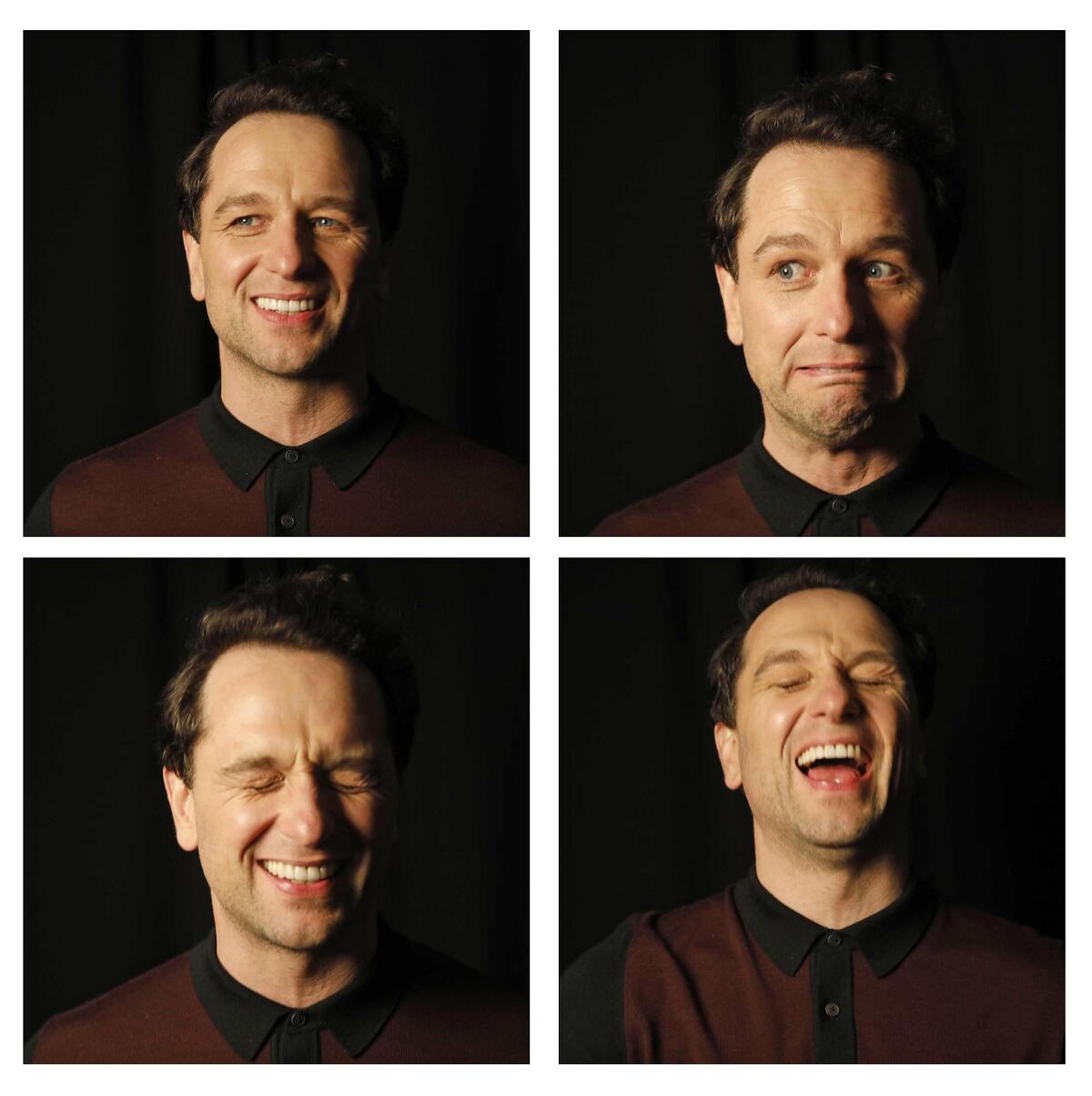Matthew Rhys finds story in the silences of ‘Beautiful Day in the Neighborhood’

- Share via
During one of his first meetings with director Marielle Heller about “A Beautiful Day in the Neighborhood,” Welsh actor Matthew Rhys said the conversation took an unexpected turn. “What she really wanted to talk about was ‘The Americans’ — how fast we shot it, wigs, all that stuff. She’s a fan,” Rhys, says, referring to the FX spy thriller where for six seasons he starred as a disguise-happy Soviet KGB officer posing as a U.S. citizen.
When it came to his “Beautiful Day” character, Lloyd Vogel — which is loosely based on Esquire’s Tom Junod and his perspective-changing experience profiling cherished TV personality Fred Rogers (Tom Hanks) — Rhys was already bingeing on old episodes of “Mister Rogers’ Neighborhood,” poring over ‘90s Esquire articles and going on what he calls “my usual deep dive,” in this case into the psyche of a doubting journalist.
When “The Americans” was first being developed as an FX series, there was one potential hitch in telling a story about a suburban couple in the 1980s who actually were embedded KGB agents: Post-Cold War Russians didn’t scare us anymore.
Recently, Rhys could be found at L.A.’s Chateau Marmont discussing American accents, his transformative costar and why he dislikes watching himself on screens, big and small. “I get hung up on all the wrong things — like, ‘I’ve got to change my weird walk,’” says Rhys, adding that his apprehensions were only heightened when Heller insisted he view “Beautiful Day” with her in an editing bay. “It was kind of worse. There I was with the person who made it. There was nowhere to hide.”
Your scenes with Hanks often involved little dialogue. Did it take you awhile to get used to extended silences?
Yes, and it was weird, because [I’d] think, “This will never make it in the movie. This will be cut.” But Mari was big on it. She’d say to us all the time, “Slow down. Bathe in those silences.” She’d be, like, “I’ll decide in the edit what gets cut. Don’t edit for me.” There was a long scene between Tom and I, and that was when I started to get into the silences. The silences became more than the words.
Marielle Heller’s “A Beautiful Day in the Neighborhood” brings Mr. Rogers’ lifelong message of kindness and love to movie screens later this year.
Did you know that “Beautiful Day” would resonate especially with men?
Mari called it early on. She was, like, “I want to make this about men for men.” She was always big on: “You have to talk about your feelings.” “You have to take an equal role in whatever parenting is to you.” “It’s OK to say ‘I love you’ or to forgive someone.” She was big on moments like where I put the [baby’s] milk on [the burner] to heat. I thought, “Oh, this is going to get cut. The process takes too long for that shot.” And she was, like, [determined voice] I’m keeping this moment. I want someone see a man heat up a bottle of milk and feed a baby.”
You spent time with Tom Junod. What did you want to learn?
His interview technique. He said it was very simple. It was at a time in the ‘90s when journalism had a lot more money and you could be embedded with the subject for like two weeks. He’d just wait. He said, “I’d try and be as quiet as possible,” and then there’d be something, and he’d be on it like a fox. With Fred, he met his match, the Zen master of deflection. I don’t think Fred liked talking about himself. So the two circled each other for days. Then Fred latched onto something, and Tom was, like, [startled voice] “Hang on.”
Did you watch Fred Rogers’ show when you were growing up in Cardiff, Wales?
No. One thing I appreciated was that I came to him with a blank canvas. I’d nothing to cover up. No reverence, no animosity, nothing. But the deeper I dived, the more my love of him grew. Profoundly. He was incredible.
Talk about the first time you saw Tom Hanks turn into the soft-spoken, cardigan-wearing groundbreaker.
When we rehearsed, he wasn’t doing anything Fred-like, just saying the lines. Then he went away. The first scene he shot was when he turns up with a pie. He had to walk in, and everyone was, like [tilts his face up with an eagerly expectant expression]. By that time we were all versed in Fred Rogers. Everyone was, like, “What’s [Tom] going to do?” The only time I’ve seen this before was with [Steven] Spielberg, where people are so star-struck, and he goes around putting everyone at ease. I kind of felt sorry for him.
To what do you owe your American accent, which is perhaps the best one in Hollywood today?
I think it’s a combination of things: An early childhood obsession with American television — “Starsky and Hutch,” “A-Team,” “Baywatch” [laughs]. American films, westerns especially. All the John Ford films. It was so exotic to me. Then I went to a drama school where the discipline of learning different dialects was very strong. I also have a kind of affliction: My ear is very musical, so if I hear a sound, I try to emulate it. This is something I’ve done my whole life, much to the annoyance of some.
More to Read
Only good movies
Get the Indie Focus newsletter, Mark Olsen's weekly guide to the world of cinema.
You may occasionally receive promotional content from the Los Angeles Times.








